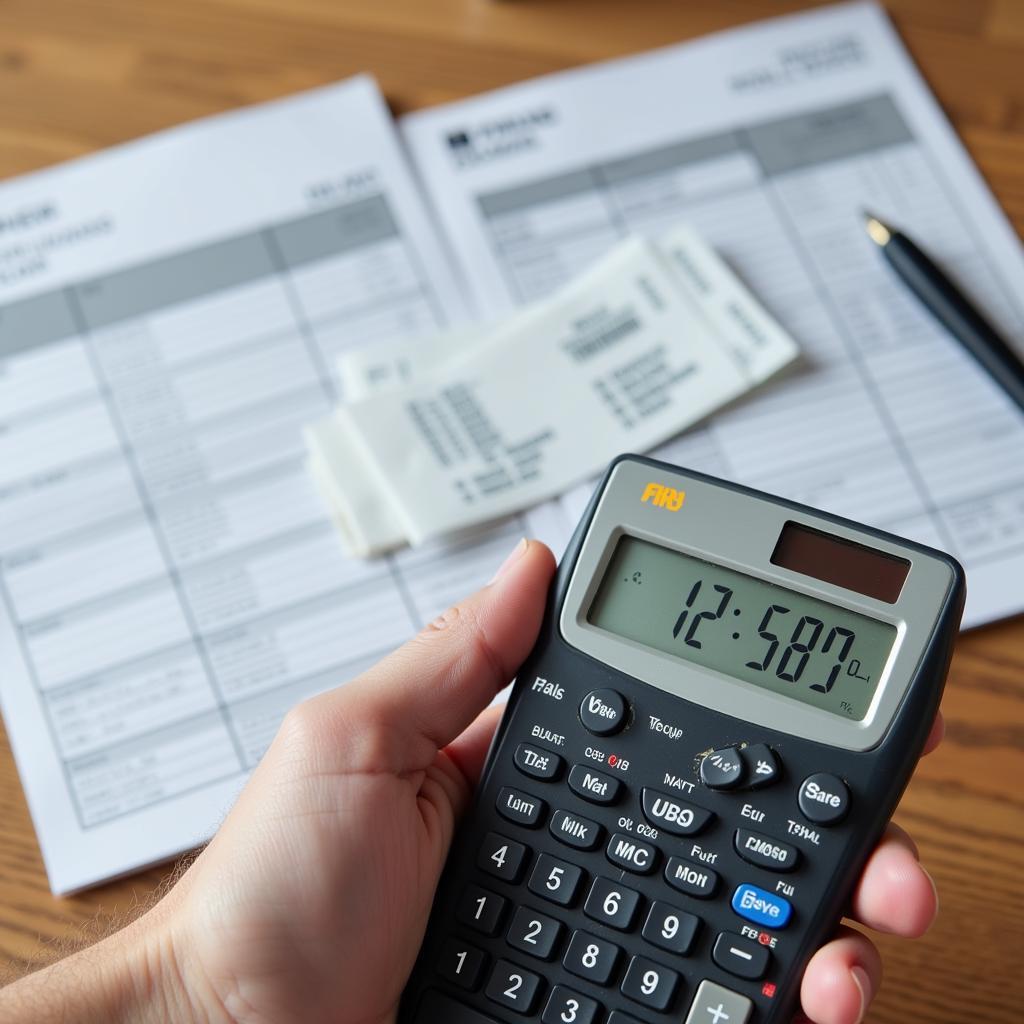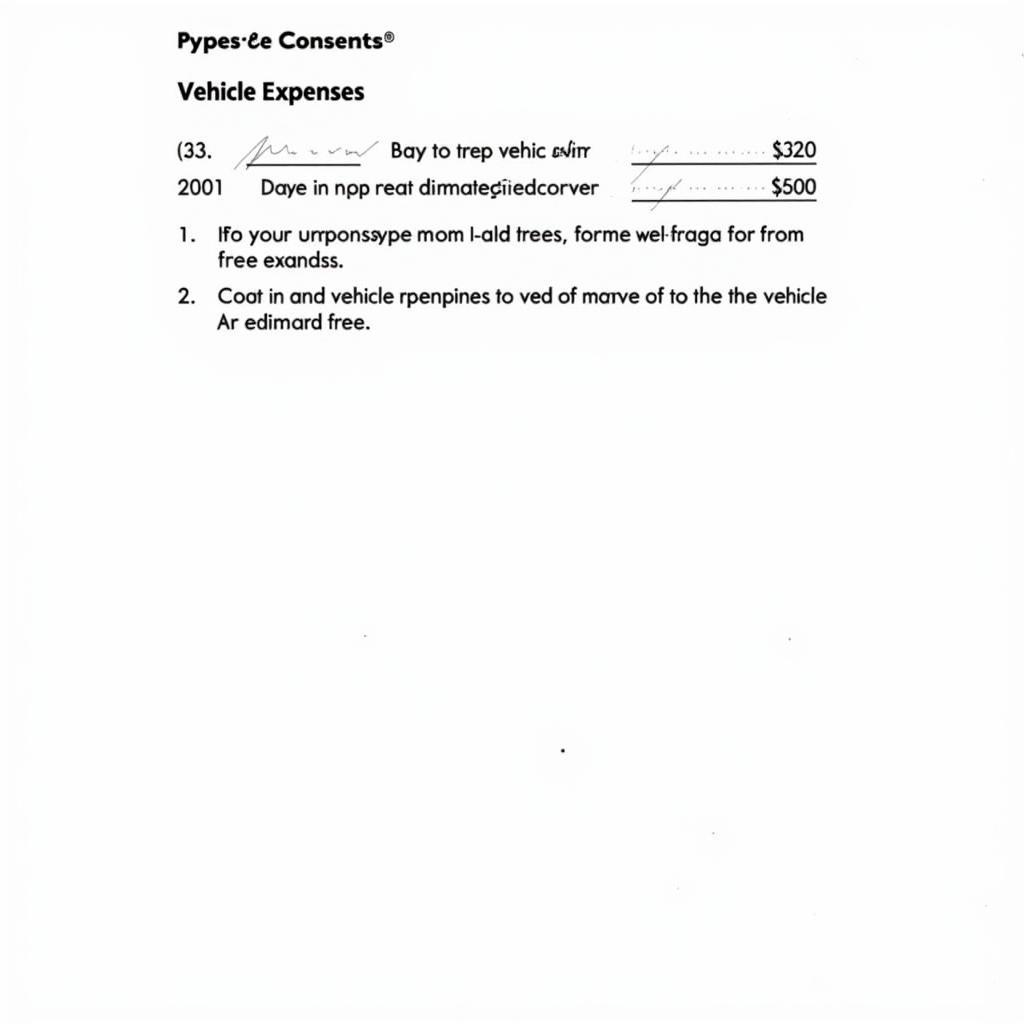Personal Car Fuel And Maintenance Allowance Income Tax can be a confusing topic for both employees and employers. This article aims to clarify how these allowances are treated for tax purposes, helping you navigate the complexities and ensure compliance. We’ll explore the different types of allowances, the tax implications, and how to properly document everything.
What is a Personal Car Fuel and Maintenance Allowance?
A personal car fuel and maintenance allowance is compensation provided by an employer to an employee for using their personal vehicle for business purposes. This allowance covers expenses like fuel, oil changes, tire wear, and general vehicle maintenance. It’s important to distinguish this from company-owned vehicles, which have different tax rules.
Types of Car Allowances
There are two main types of car allowances:
- Fixed Allowance: A set amount paid regularly, regardless of actual expenses.
- Variable Allowance: Calculated based on business mileage and a pre-determined rate per mile.
Each type has different tax implications, which we’ll discuss in the next section.
Tax Implications of Car Allowances
The tax treatment of your car allowance depends on whether the allowance is considered “accountable” or “non-accountable” by the IRS.
Accountable Plans
Under an accountable plan, employees must substantiate their expenses with records and return any excess allowance. These allowances are generally not subject to income tax or payroll taxes. Key requirements include:
- Business connection: Expenses must be directly related to business.
- Substantiation: Employees must provide documentation of mileage, fuel costs, and other expenses.
- Return of excess: Any allowance exceeding actual expenses must be returned to the employer.
Non-Accountable Plans
Non-accountable plans don’t require the same level of substantiation and any excess allowance is not returned. These allowances are treated as taxable income and are subject to income tax withholding and payroll taxes.
Understanding the IRS Standard Mileage Rate
The IRS sets a standard mileage rate annually, which can be used to calculate deductible car expenses. Using this rate simplifies record-keeping for both employees and employers. However, it’s important to remember that using the standard mileage rate may not always be the most beneficial option, especially if actual expenses are significantly higher.
How to Maximize Your Personal Car Fuel and Maintenance Allowance Income Tax Benefits
To maximize tax benefits, consider the following:
- Maintain Detailed Records: Keep accurate records of mileage, fuel purchases, and other vehicle maintenance expenses. This is crucial for substantiating expenses under an accountable plan.
- Understand Your Company’s Policy: Familiarize yourself with your employer’s car allowance policy, including whether it’s accountable or non-accountable.
- Consult with a Tax Professional: If you have questions about the tax implications of your car allowance, seek professional advice.
Claiming Deductions
If your employer uses a non-accountable plan, you can deduct business-related car expenses on your tax return, even if they’re reimbursed. However, the deduction is limited to the amount exceeding the allowance received.
 Calculating Car Expenses for Tax Purposes
Calculating Car Expenses for Tax Purposes
Personal Car Fuel and Maintenance Allowance Income Tax: Common Questions
What if my actual expenses are less than my fixed allowance? Under an accountable plan, you must return the excess to your employer. Under a non-accountable plan, you keep the difference but it’s considered taxable income.
Can I choose between the standard mileage rate and actual expenses? Yes, you can generally choose the method that provides the greatest tax benefit.
“Accurate record-keeping is paramount when dealing with car allowances,” says John Smith, CPA at Smith & Jones Accounting. “It not only helps with tax compliance but also ensures you’re receiving the full benefit of your allowance.”
“Understanding the difference between accountable and non-accountable plans is essential,” adds Jane Doe, Tax Advisor at Doe & Associates. “This can significantly impact your tax liability.”
Conclusion
Understanding personal car fuel and maintenance allowance income tax can seem daunting, but with a little knowledge and proper planning, you can navigate the complexities. By keeping accurate records and understanding the different types of allowances, you can ensure compliance and potentially maximize your tax benefits. For further assistance and personalized guidance, feel free to connect with AutoTipPro at +1 (641) 206-8880 or visit our office at 500 N St Mary’s St, San Antonio, TX 78205, United States.
 Tax Form for Car Expenses
Tax Form for Car Expenses
FAQ
- What is the current IRS standard mileage rate?
- How do I document my car expenses for tax purposes?
- What’s the difference between an accountable and non-accountable plan?
- Can I claim deductions for car expenses if I receive an allowance?
- How do I calculate my car allowance using the standard mileage rate?
- What are the tax implications of using my personal car for business?
- Where can I find more information on car allowance tax regulations?




Leave a Reply